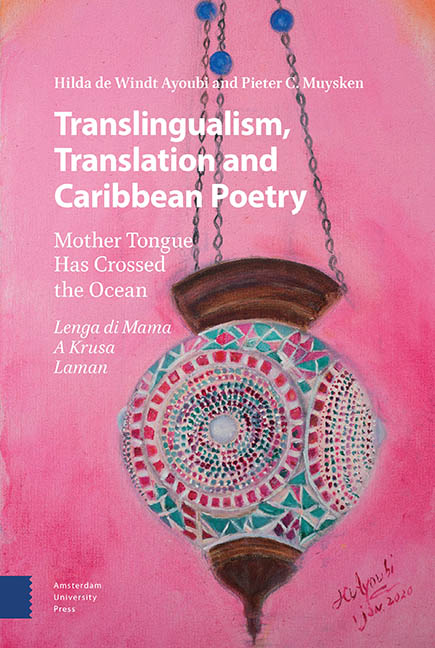Book contents
- Frontmatter
- Dedication
- Contents
- How to Navigate This Book: Kon Nabegá den e Buki akí
- Acknowledgements
- Preface
- Part 1 Introducing the Mother Tongue: Introdukshon di Lenga di Mama
- Part 2 The Poem “Lenga di Mama” and its Translations, Comments and Language Descriptions E Poema “Lenga di Mama” i su Tradukshonnan i Komentario i Deskripshon di e Idiomanan
- Part 3 The Poem “E ‘papiá’ di Papiamentu” and its Translations E Poema “E ‘papiá’ di Papiamentu” i su Tradukshonnan
- Part 4 The Poem “Papiamentu pa Semper” and its Translations E Poema “Papiamentu pa Semper” i su Tradukshonnan: The Translations and Editing of the Poem Hilda de Windt Ayoubi and Pieter Muysken (for Dutch)
- Part 5 The Poem “Riba Ala di Lenga di Mama” and its Translations E Poema “Riba Ala di Lenga di Mama” i su Tradukshonnan
- Part 6 Commentary: Komentario
- Note on the Authors: Informashon tokante e Outornan
- Index: Índise
Romance Languages: Idioma Romániko
Published online by Cambridge University Press: 15 September 2022
- Frontmatter
- Dedication
- Contents
- How to Navigate This Book: Kon Nabegá den e Buki akí
- Acknowledgements
- Preface
- Part 1 Introducing the Mother Tongue: Introdukshon di Lenga di Mama
- Part 2 The Poem “Lenga di Mama” and its Translations, Comments and Language Descriptions E Poema “Lenga di Mama” i su Tradukshonnan i Komentario i Deskripshon di e Idiomanan
- Part 3 The Poem “E ‘papiá’ di Papiamentu” and its Translations E Poema “E ‘papiá’ di Papiamentu” i su Tradukshonnan
- Part 4 The Poem “Papiamentu pa Semper” and its Translations E Poema “Papiamentu pa Semper” i su Tradukshonnan: The Translations and Editing of the Poem Hilda de Windt Ayoubi and Pieter Muysken (for Dutch)
- Part 5 The Poem “Riba Ala di Lenga di Mama” and its Translations E Poema “Riba Ala di Lenga di Mama” i su Tradukshonnan
- Part 6 Commentary: Komentario
- Note on the Authors: Informashon tokante e Outornan
- Index: Índise
Summary
Abstract
Several Romance languages are represented here:Catalan French, Spanish, Portuguese, and Italian.All originate in the Vulgar Latin of the lateRoman Empire; all have been very important in thecultural history of western Europe and continue tobe so today. It is immediately obvious that theyare closely related. The word for “hand”, forinstance, is má inCatalan, main inFrench, mano inSpanish and Italian, and mão in Portuguese. Though they stem fromLatin, they do not share many of the grammaticalcharacteristics of Latin, such as the Latin caseendings.
Keywords: Cultural History, LiteraryHistory, (Vulgar) Latin, Literature, SecondLanguages
Little need to introduce the Frenchlanguage here. It has lost quite a bit of its statusas a language of international communication, but itis spoken natively in most of France and parts ofBelgium, Luxemburg, Switzerland, and Canada. It isthe official language of 29 countries (also of someislands in the Caribbean, Guadeloupe, Haiti,Martinique, Saint Barthelemy, French Guiana andSaint-Martin), but in many of these it is primarilyused as a second language. This also means thatthere is much diversity in the way French is spoken,although presumably there is a single “standard” inFrench, corresponding to educated Parisian French.There has been a large literature in French sincethe early Middle Ages. In the Francophone countries,including countries in Africa, authors write andpublish in French. French does not have the sameflexibility as Spanish to change the grammaticalorder of the parts of the sentence. For instance,existent dans notre monde“exist in our world” in the translationis the only order possible. France has theappearance now of a fairly monolingual country, butin earlier times, before the French Revolution andNapoleon in particular, the country was much moremultilingual. In the north there was a Dutchspeaking region, the Breton speaking area was muchlarger, in the southwest there was Gascon andBasque, in the south Provencal was widely spoken,and in the east Alsatian German was spoken. Inaddition, there were many dialects.
Catalan, catala or llengua catalana is aWestern Romance language derived from VulgarLatin.
- Type
- Chapter
- Information
- Translingualism, Translation and Caribbean PoetryMother Tongue Has Crossed the Ocean, pp. 173 - 190Publisher: Amsterdam University PressPrint publication year: 2022



